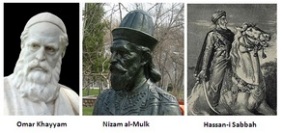What do these three Persian men have in common? Among many other things, they are central figures of two historical fiction novels, “Samarkand” and “Alamut”, which are based on the same story: Legend states that they made a pact of eternal friendship, in case one of them rise to prominence, he would help the other two to become powerful too. Nizam al-Mulk was the first to do this by becoming vizier at the Seljuq Empire. Then he offered positions to both of them, Hassan accepted, Omar declined.
Samarkand is written by Amin Maalouf and has two parts: First part of the story is taking place in Persia (Iran) and Asia in the 11th Century and main figure is Omar Khayyam and his poet book Rubaiyat. Nizam al-Mulk and Hassan-i Sabbah are two other important figures of the first part. The second part of the book is about an American to obtain the original copy of the Rubaiyat during 1900s.
Alamut is written by Wladimir Bartol, takes place in 11th Century with its story around Hassan-i Sabbah and his establishment, Hashshashins, in Alamut fortress, where Fedais are trained under the influence of Hashish and deceived Heaven promise to commit dreadful assassinations. Other two figures of the pact, Nizam al-Mulk and Omar Khayyam (to lesser extend) appears throughout the novel. The maxim of the novel is “Nothing is an absolute reality, all is permitted”.
If you are interested in historical fiction both of these books are right choices. Rather than making detailed summary of these books for the rest of this post, I preferred to highlight interesting and noteworthy parts of the actual biographies of these three Persian men:
Omar Khayyam: He was a poet, philosopher, and scientist. He lived from 1048 to 1131 and made significant contributions in mathematics and calendar systems. He taught for decades the works of Avicenna (Ibn Sina), father of modern medicine. Khayyam is one of the most famous poets of the East in the West with his work Rubaiyat. Some lines from Khayyam:
- Be happy for this moment. This moment is your life.
- Dead yesterdays and unborn tomorrows, why worry about it, if today be sweet.
- Your hand can seize today, but not tomorrow; and thoughts of your tomorrow are nothing but desire. “The rest of your life” won’t last forever.
Nizam al-Mulk (Order of the Realm): He was the vizier of the Seljuq Empire from 1064 to 1092, when first Alp Arslan and then his son Malik Shah were Sultans. He was a great vizier, organizer, ideal soldier and scholar. It was only possible thanks to him for the Seljuq Turks to establish a powerful empire. Nizamiyyah schools and Siyasatnama (The Book of Government) were his main heritage to the following generations. Some people call him as the Machiavelli of the 11th Century.
Hassan-i Sabbah: Villain or great thinker ? I am still not sure. He lived between 1050 to 1124, travelled various cities (Tehran, Cairo, Baghdad, Isfahan…) and at the end spend last 35 years of his life in Alamut Castle in the Alborz Mountains where he established the order of the Hashshashin, or “Assassins”.

